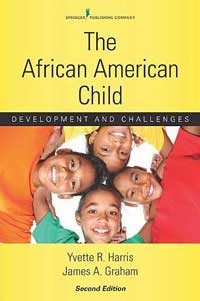 302 pages
302 pages8 CE credits
Course Enrollment
$200.00
Add to Cart
All exams are taken online. The exam for this course will be available in "My Courses" immediately upon enrollment. Note the book is not included.
The book is available for purchase from Amazon.
As an Amazon Associate we receive a rebate from qualifying purchases.
THE AFRICAN AMERICAN CHILD
Development and Challenges, 2nd Edition
Yvette Harris, Ph.D, and James A. Graham, Ph.DSpringer Publishing, 2014
DESCRIPTION
This is an evenhanded examination of the challenges affecting the lives of African American children that emphasizes their strengths and resiliency rather than deficits. It is the only text to comprehensively consider the biological, emotional, social, and cultural domains of development in this population. The second edition reflects an acceleration of research on the development of racial identity in African American children, a shift from the dictates of "No Child Left Behind" to a more flexible approach to student academic evaluation, and changes in the economic conditions of African American children and their families. The book also reflects the increase in the number of African American children in foster care and those with incarcerated parents. New coverage also includes new information about the mental health of African Americans, and a new chapter on adolescent development.
This new edition features updated statistical information on health problems, healthcare access, new diagnostic techniques, new treatment approaches, and the number of children of African origin. It provides an expanded discussion of the value of qualitative methodology, ethical issues in research, and a discussion of the characteristics of middle and upper class African American families. End-of-chapter discussion questions, an "Insider's Voice" in each chapter that highlights important elements, and an "Issues Box" that highlights historic and legal issues also enhance the second edition.
New to the Second Edition:
• New inclusion of information on African American adolescents
• A discussion of the impact of parental incarceration on the long- and short-term outcomes of African American children
• Updated statistical information on health, academic performance, language and literacy, and other issues
• Information about children of African origin and their families
• Information about middle and upper class African American families
• Expanded discussion of the value of qualitative methodology and ethical issues in research on African American children
• New diagnostic techniques and treatment approaches for sickle cell anemia
• Update on work with AA families and children in therapy and the role of community focused therapy
• A discussion of the role of self-efficacy on academic competence, the influence of NCLB on academic performance, and current initiatives to improve academic outcomes for African American children
• The current status of Oakland School Board's Ebonics Resolution
• New information on Prosocial Behavior and Empathy and Aggressive/Antisocial behavior among African American children
• Expanded section on how communities affect the lives of African American children including research on African American children and the media
• End-of-chapter discussion questions
• "Insider's Voice" and "Issues Box" features in each chapter
The reader will be able to:
• Compile some significant statistics about African American children and their families
• Analyze the role(s) that demographics plays in regards to formulating ethical behavior
• Research issues specific to working with AA families and children and the role of community at large
• Explore specific health issues in AA communities affecting children, including those for sickle cell anemia
• Analyze the various mental health issues in African American children and their families and caretakers
• Review effective education resources that can influence children's academic performance
• Explore statistical information on language and literacy
• Discuss the parameters of moral development
• Explain what social contexts are involved in the lives of AA children
AUTHOR
Yvette Harris, Ph.D is Professor of Psychology, Miami University, Ohio. James Graham, Ph.D is Professor of Psychology, The College of New Jersey.
ISHK CE at Home
1702-L Meridian Ave., #266
San Jose, CA 95125-5586
This website uses cookies to ensure you get the best experience on our website. Learn more
